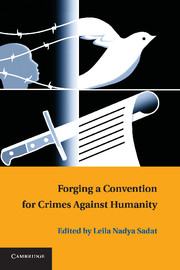Book contents
- Frontmatter
- Contents
- Figures and Maps
- Crimes Against Humanity Initiative: Steering Committee
- Biographies of Contributors
- Foreword
- Preface and Acknowledgments
- Crimes Against Humanity and the Responsibility to Protect
- 1 History of Efforts to Codify Crimes Against Humanity
- 2 The Universal Repression of Crimes Against Humanity before National Jurisdictions
- 3 Revisiting the Architecture of Crimes Against Humanity
- 4 The Bright Red Thread
- 5 Gender-Based Crimes Against Humanity
- 6 “Chapeau Elements” of Crimes Against Humanity in the Jurisprudence of the UN Ad Hoc Tribunals
- 7 The Definition of Crimes Against Humanity and the Question of a “Policy” Element
- 8 Ethnic Cleansing as Euphemism, Metaphor, Criminology, and Law
- 9 Immunities and Amnesties
- 10 Modes of Participation
- 11 Terrorism and Crimes Against Humanity
- 12 Crimes Against Humanity and the International Criminal Court
- 13 Crimes Against Humanity and the Responsibility to Protect
- 14 Re-enforcing Enforcement in a Specialized Convention on Crimes Against Humanity
- 15 Why the World Needs an International Convention on Crimes Against Humanity
- Appendices
- Testimonials and Endorsements
- Index
- References
3 - Revisiting the Architecture of Crimes Against Humanity
Almost a Century in the Making, with Gaps and Ambiguities Remaining – the Need for a Specialized Convention
Published online by Cambridge University Press: 01 June 2011
- Frontmatter
- Contents
- Figures and Maps
- Crimes Against Humanity Initiative: Steering Committee
- Biographies of Contributors
- Foreword
- Preface and Acknowledgments
- Crimes Against Humanity and the Responsibility to Protect
- 1 History of Efforts to Codify Crimes Against Humanity
- 2 The Universal Repression of Crimes Against Humanity before National Jurisdictions
- 3 Revisiting the Architecture of Crimes Against Humanity
- 4 The Bright Red Thread
- 5 Gender-Based Crimes Against Humanity
- 6 “Chapeau Elements” of Crimes Against Humanity in the Jurisprudence of the UN Ad Hoc Tribunals
- 7 The Definition of Crimes Against Humanity and the Question of a “Policy” Element
- 8 Ethnic Cleansing as Euphemism, Metaphor, Criminology, and Law
- 9 Immunities and Amnesties
- 10 Modes of Participation
- 11 Terrorism and Crimes Against Humanity
- 12 Crimes Against Humanity and the International Criminal Court
- 13 Crimes Against Humanity and the Responsibility to Protect
- 14 Re-enforcing Enforcement in a Specialized Convention on Crimes Against Humanity
- 15 Why the World Needs an International Convention on Crimes Against Humanity
- Appendices
- Testimonials and Endorsements
- Index
- References
Summary
INTRODUCTION
International law is essentially the product of State interests. Even in this era of globalization, it remains under the long shadow of the Westphalian paradigm founded on State sovereignty. Progress, however, has been achieved as States' interests and the values that their societies embrace have converged, demanding greater conformity by States to certain human aspirations. Spurred by economic globalization, States' international cooperation has increased substantially. In some areas, it has given rise to collective decision-making processes. Among developments in which State sovereignty has given way to collective interests and values are those that occurred in the field of human rights and International Criminal Law (ICL). Both fields have been driven by ideas that with time have acquired an incrementally higher level of value recognition from broader and diverse constituencies. Admittedly, progress in these fields has been slower and more painstaking than in the economic field. What has been achieved in the fields of human rights and ICL is the result of a process of accretion that strengthened ideas about human values throughout the history of several civilizations.
History records that such accretion is the result of an evolutionary process. It begins with the emergence of an idea that then grows in its acceptance by different constituencies, and is then followed by a stage of prescriptive articulation that eventually leads to the stage of proscriptive normative formulation. Finally, it ripens into the establishment of enforcement mechanisms.
- Type
- Chapter
- Information
- Forging a Convention for Crimes against Humanity , pp. 43 - 58Publisher: Cambridge University PressPrint publication year: 2011
References
- 4
- Cited by



